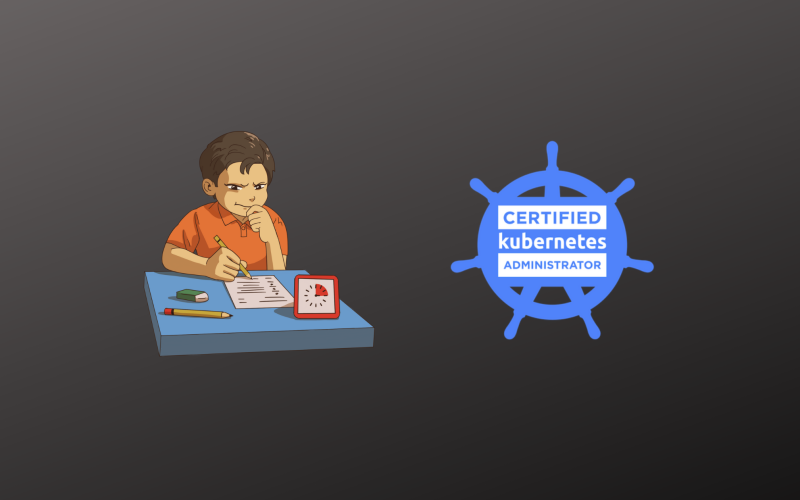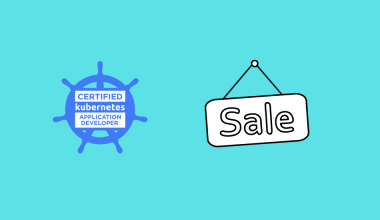The Certified Kubernetes Administrator (CKA) exam is a rigorous and challenging test that measures your knowledge and skills in administering a Kubernetes cluster.
The Certified Kubernetes Administrator (CKA) exam is a performance-based test that measures your ability to perform common tasks as a Kubernetes administrator. The exam is administered by the Cloud Native Computing Foundation (CNCF) and is designed to ensure that you have the necessary skills and knowledge to effectively administer a Kubernetes cluster.
CKA Exam Details
Here are all the details you should know about the CKA exam
- CKA Exam Format: The CKA exam is a hands-on test that is conducted in a live environment using real Kubernetes clusters. You will be given a set of tasks to complete within a three-hour time limit.
- Topics covered: The CKA exam covers a wide range of topics, including installation and configuration, networking, monitoring and logging, security, scheduling, and storage. You should be familiar with these topics and be able to apply your knowledge to real-world scenarios.
- Prerequisites: To take the CKA exam, you need to have at least six months of experience working with Kubernetes, including deploying applications, running commands on a cluster, and using kubectl. You should also be familiar with the basic concepts of Kubernetes, such as pods, nodes, and services.
- Exam fees: The CNCF charges a fee to take the CKA exam. The current fee is $300 for CNCF members and $395 for non-members.
- Exam registration: To register for the CKA exam, you will need to create an account on the CNCF website and pay the exam fee. You can then schedule a time to take the exam at a testing center near you.
- Retake policy: If you do not pass the CKA exam on your first attempt, you will be allowed to retake the exam after a waiting period of 14 days. There is a fee to retake the exam.
CKA Exam Preparation Guide
To help you prepare for the exam, here is a detailed study guide that covers the key topics you need to know:
- Core Concepts: You should be familiar with the basic concepts of Kubernetes, such as pods, nodes, services, and labels. You should also understand how to deploy and manage applications on a Kubernetes cluster.
- Installation and Configuration: You should be able to install and configure a Kubernetes cluster, including the control plane and worker nodes. You should also be familiar with different deployment options, such as using a cloud provider or installing on bare metal.
- Networking: You should understand how networking works in Kubernetes, including how to use services and ingress resources to expose applications to the outside world. You should also be familiar with network policies and how to troubleshoot networking issues.
- Monitoring and Logging: You should be able to set up monitoring and logging for a Kubernetes cluster, including using tools like Prometheus and Grafana. You should also be able to interpret log files and troubleshoot issues based on log data.
- Security: You should be familiar with best practices for securing a Kubernetes cluster, including how to use TLS certificates, access controls, and network policies. You should also know how to troubleshoot security issues.
- Scheduling: You should understand how the Kubernetes scheduler works and how to use resource limits and reservations to ensure that your applications have the resources they need. You should also be able to troubleshoot scheduling issues.
- Storage: You should be familiar with different storage options for Kubernetes, including persistent volumes and storage classes. You should also know how to manage storage in a Kubernetes cluster, including how to create and delete persistent volumes.
- Upgrades and Maintenance: You should be able to perform upgrades and maintenance tasks on a Kubernetes cluster, including rolling updates and backing up and restoring data.
How to Prepare for CKA Exam
Here are some steps you can take to prepare for the Certified Kubernetes Administrator (CKA) exam:
- Gather the necessary prerequisites: To take the CKA exam, you need to have at least six months of experience working with Kubernetes, including deploying applications, running commands on a cluster, and using kubectl. You should also be familiar with the basic concepts of Kubernetes, such as pods, nodes, and services.
- Review the exam objectives: The CKA exam covers a wide range of topics, including installation and configuration, networking, monitoring and logging, security, scheduling, and storage. Familiarize yourself with the exam objectives to understand what you need to know for the test.
- Get hands-on experience: The best way to prepare for the CKA exam is to get hands-on experience working with Kubernetes. Consider setting up your own cluster and experimenting with different configurations and deployment scenarios.
- Learn from online resources: There are many online resources available to help you prepare for the CKA exam, including tutorials, blog posts, and training courses. Consider working through these resources to deepen your understanding of Kubernetes.
- Practice with practice exams: Practice exams can help you get a sense of the types of questions you can expect on the CKA exam and identify any areas where you need to focus your study. Consider working through a few practice exams to get a feel for the test.
- Take a training course: If you want more structured guidance in your studies, consider taking a training course on Kubernetes. Many training providers offer courses specifically designed to help you prepare for the CKA exam.
Best Resources to Prepare for the CKA exam
There are many resources available to help you prepare for the Certified Kubernetes Administrator (CKA) exam. Here are a few options to consider:
- The Kubernetes documentation: The official Kubernetes documentation is a comprehensive resource that covers all the topics you need to know for the CKA exam. It includes detailed explanations and examples of how to use different Kubernetes features and tools.
- The Kubernetes Certified Administrator (CKA) Curriculum: This is a detailed study guide developed by the Cloud Native Computing Foundation (CNCF) that covers all the topics you need to know for the CKA exam. It includes hands-on exercises and practice questions to help you prepare.
- Training courses: Many training providers offer courses specifically designed to help you prepare for the CKA exam. These courses typically include instructor-led lectures, hands-on labs, and practice exams to help you learn the material and test your knowledge.
- Practice exams: Practice exams can help you get a sense of the types of questions you can expect on the CKA exam and identify any areas where you need to focus your study. There are a number of practice exams available online that you can use to test your knowledge. Also, make use of two free killer.sh practice sessions you get with the exam registration.
- Blog posts and online tutorials: There are many blog posts and online tutorials available that cover different aspects of Kubernetes and can help you prepare for the CKA exam. Consider working through these resources to deepen your understanding of the material.
How to Get CKA Exam Discount
The Cloud Native Computing Foundation (CNCF), which administers the Certified Kubernetes Administrator (CKA) exam, offers a few options for discounts on the exam fee.
Get a $60 discount on the CKA exam using the exclusive coupon code.
Coupon: Use code SCOFFER15 at checkout
Here are a few ways you may be able to get a discount on the CKA exam:
- First, check out the CKA Exam coupon page to get the latest discounts from CNCF
- Group discounts: If you are part of a group of five or more individuals who are all interested in taking the CKA exam, you may be eligible for a group discount. To request a group discount, you can contact the CNCF at [email protected].
- Training discounts: Some training providers offer discounts on the CKA exam as part of their training courses. If you are considering taking a training course to prepare for the exam, be sure to ask about any exam discounts that may be available.
- Promotional discounts: The CNCF occasionally offers promotional discounts on the CKA exam as part of special events or promotions. Keep an eye on the CNCF website or social media channels to stay informed about any promotional discounts that may be available.
- Student discounts: If you are a full-time student, you may be eligible for a discount on the CKA exam. To request a student discount, you can contact the CNCF at [email protected]. You will need to provide proof of full-time enrollment in a degree-granting program.
Keep in mind that these discounts may not always be available, and the terms and conditions for each discount may vary. Be sure to check with the CNCF or the relevant training provider for the most up-to-date information on available discounts.
Conclusion
In conclusion, the Certified Kubernetes Administrator (CKA) exam is a challenging and rigorous test that measures your knowledge and skills in administering a Kubernetes cluster. To prepare for the exam, you should have hands-on experience working with Kubernetes and be familiar with the concepts and tools covered in the exam.
You should also consider taking a training course or working through practice exams to help you prepare. By following a comprehensive study plan and putting in the necessary time and effort, you can increase your chances of success on the CKA exam. Good luck on the exam!
If you are preparing for other Linux foundation certifications, check out the Linux Foundation Coupon to save on all certifications.


